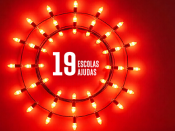Por Martha Havenith (Ernst-Strüngmann Institute for Neuroscience, Frankfurt).
Psychoactive substances are one way to explore altered states of consciousness (ASCs) - but by far not the only one. Traditions across the globe have used physical challenges like fasting, sleep deprivation, extreme temperatures or pain in order to evoke ASCs in ceremonial settings. One of the most widespread and accessible practices in this vein is voluntary hyperventilation, often referred to as breathwork. Unlike the more subtle effects of slow-breath practices, breathwork can trigger immediate and at times dramatic mental shifts. It may conjure up visual experiences, resurface memories, or trigger intense expressions of emotion. How can simply changing the rhythm of your breath so profoundly alter your conscious state? Neuroscience has only just begun to address this question, and in this talk I will discuss current insights into the physiological and neuronal mechanisms by which breathing – conscious and unconscious - can shape cognitive processing. We will focus on hyperventilation-based approaches such as Holotropic/Connective Breathwork and Tummo, and explore how an interplay between O2-CO2 balance, blood pH, cortical blood flow and neurotransmitter release may give rise to the extraordinary subjective experiences that can be evoked by breathwork.
Bio: Martha Havenith is a Max Planck research group leader at the Ernst-Strüngmann Institute for Neuroscience, where she uses virtual-reality tasks to explore the brain’s astonishing ability to juggle multiple ongoing cognitive processes in the same group of neurons. Her previous career milestones include an M.Sc. at Oxford University, a Ph.D. at the Max Planck Institute for Brain Research (Frankfurt), and post-doctoral fellowships at University College London and the Donders Institute for Brain, Cognition and Behaviour (Nijmegen). She is also a certified facilitator for Connective Breathwork. In that capacity, she regularly facilitates breathwork sessions for individuals and small groups, as well as offering facilitator training to medical professionals.
Transmissão via Zoom.
















